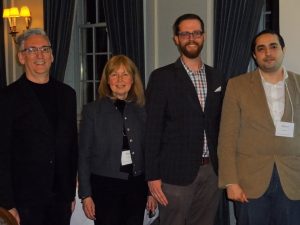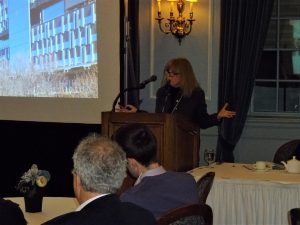Resilient Communities and Buildings, and a Technology to Determine the Risk ... and the Reward
Resilience, from the macro, community level, down to the micro, single dwelling level, can provide economic opportunities to the community which would otherwise not be present, demonstrating a rather healthy return on investment...
with reports from the field, sharing some surprising discoveries on how to effectively weave resilience measures into the design of our buildings and communities...
and, a technology with which to perform a comprehensive risk assessment on buildings and structures (proposed or existing), through a dependency map, to test risk scenarios and to develop mitigation strategies with associated costs, and to propose an ROI.

From left: Paul Dowsett (MC), Birgit Siber, Donald Peckover and Ahmed Youssef

Birgit Siber at the desk
Speakers:
Donald Peckover - Resilient Neighbourhoods and Economic Opportunities for the Future
Be it hurricane, ice storm, flood, or wildfire, there are few greater threats to a community than natural disaster. The design and planning of our cities and economies must be able to respond to disaster, bounce back, resume operation, and be a catalyst for redevelopment — all in addition to being safe havens for their residents. In the wake of many such disasters, litigation and claims burden communities, governments, and insurers for years. Many setbacks in the fabric of our cities - social, economic, and infrastructure - can be mitigated and prevented from reoccurring by building disaster-resilient communities and economies in the first place. Reducing disaster risk before a severe event occurs has a direct impact on how quickly and effectively a community can recover. This in turn can help promote the economic growth of robust and vibrant communities. The slides of this presentation can be found here.
Donald Peckover is an Architectural Designer at SUSTAINABLE.TO Architecture + Building (STO), a professional architecture practice in Toronto focusing on not only on sustainable design, but also on resilient buildings and community engagement. Donald has experience in designing and building homes and communities across North America - including disaster-prone areas such as the Atlantic coasts of Florida and Far Rockaway, New York; as well as environmentally-sensitive areas of the Oak Ridges Moraine area in Ontario. With each project - from single-family homes to multi-unit and multi-use developments - it is important to respect Mother Nature not only for 99.9% of the time when She is behaving, but also that 0.1% of the time when She misbehaves.
Birgit Siber - Resilience: Notes from the Field
Resilience has been a theme at sustainable design conferences for several years. To what extent is resilience thinking penetrating into the design of architectural projects. Birgit Siber will report from the field, share some surprising discoveries specific to the condo industry and open the conversation on how to more effectively weave resilience measures into the design of our buildings and communities. For the slides please click here.
Ms. Siber is a principal at Diamond Schmitt Architects and has practiced architecture since 1987. Sustainability has been a constant focus in Birgit’s work; she chairs the office sustainable design committee and actively promotes green building design within the office, community and at sustainable design conferences. Birgit has been instrumental in developing ecoMetrics, an in-house tool to support energy literacy, inform energy benchmarking and forward sustainable design within the office and beyond. Birgit also serves as vice chair of the Toronto 2030 District Advisory Board.
In the role of project architect, Birgit has focused on a broad range of institutional and laboratory projects including the University of Guelph-Humber, which incorporates the first innovative large scale living bio-filter plant wall, CANMET Metallurgical Materials lab for the federal government that is LEED Platinum certified and recipient of the 2015 AIA COTE Top 10 Award and most recently, Lazaridis Hall at Wilfrid Laurier University.
Dr Ahmed Youssef - Systematic Risk Management Approach for Building Systems and Components Considering Spatial and Operational Interdependencies
Over the last decade, building information modeling (BIM) has been utilized as a standardized approach to represent and analyze the complex, diverse and rich design of architectural, structural, mechanical, electrical and plumbing systems. The current state of the art, however, focuses on deploying BIM for applications limited to optimizing the design and construction process of buildings in general. Minor emphasis is being directed to using BIM to operate and maintain buildings against the many risks they face. A difficulty in doing so is that there is no means to adequately trace the effect of hazards across the systems and components of the building. Moreover, current BIM practices pay negligible consideration to the interdependencies among building systems and components which can be a key in hindering effective implementation of sustainable operation and maintenance plans. In this talk, the speaker will discuss the development of a novel methodology for extracting spatial and operational interdependencies among building systems and components in order to understand how any hazard can affect the resilience of building systems and components. The developed methodology provides visualization and analytical capabilities for assessing building’s operational risks against all hazards in 3D environment. A case study using Almonte power plant is utilized to demonstrate the developed methodology application with discussion for its results and potential improvements. His presentation slides can be seen here.
Dr. Ahmed A. Youssef is Postdoctoral Fellow at the Cities and Infrastructure Systems Lab (CISL). Before Joining CISL in 2016, Dr. Youssef was a member of the Construction Automation Laboratory at Concordia University from 2011 to 2015 where, among other things, he worked on novel methods for infrastructure dependency analysis in asset management. He offered research and consulting services for municipalities in Qatar and Canada in areas including, but not limited to, optimal strategic management of buried infrastructure, condition assessment and integrated risk assessment of large complex networks. Dr. Youssef also provided project management services as a project engineer for public infrastructure construction projects in Egypt from 2009 to 2011. Dr. Youssef received the Stephen G. Revay Award from the Canadian Society for Civil Engineering (2013) in addition to multiple academic and research awards from Canada and Egypt. He also serves as a reviewer for the ASCE Journal of Infrastructure Systems and the Structure and Infrastructure Engineering Journal. Dr. Youssef received his PhD in Civil Engineering from Concordia University in 2015 and MSc in Construction and Engineering Management from Nile University in 2010.
The event took place on May 4, 2017 at the University of Toronto Faculty Club.
Sponsored by:







